Any serious Hip-Hop fan knows how much pride we took in listening to Gangstarr in the ‘90’s. I remember getting in my car and turning up “Take It Personal” or “The Militia” as loud as the radio could go, driving down the street with the windows rolled all the way down. It made me feel like I was wearing a Versace suit, maybe even better. Some people want to buy the most expensive car or the biggest chain; if you’re a real Hip-Hop fan, listening to the best music is the equivalent of that. In the 90’s Guru and Premier were worth more than every platinum medallion ever sold. In fact, there is no comparison to even speak of.
Concurrently to building an iconic Hip-Hop following with Gangstarr, Guru would also indulge in his love for jazz music by collaborating with jazz musicians such as Roy Ayers, Donald Byrd, Lonnie Liston Smith, Ramsey Lewis and Branford Marsalis for his critically acclaimed Hip-Hop and jazz fusion series, Jazzmatazz. It’s now been three years since Gangstarr’s last album and almost six years since the most recent edition of Jazzmatazz; but fear not, Guru has been hard at work. Collaborating closely with new producer and partner Solar, Guru founded his own label, 7 Grand Records, in late 2004. Teaming with Solar in 2005 for his 7 Grand debut, The Street Scriptures; in 2006 we find Guru looking towards the future with bright optimism, ready to embrace new challenges. Recently we had a chance to catch up with Guru and Solar as the duo prepares for 7 Grand’s next release, the fourth installment of Jazzmatazz. See what’s up with all that jazz!
RIOTSOUND.COM: You’re going to be dropping the fourth installment in the Jazzmatazz series in early 2007. The first two volumes are pretty much considered classic while the third volume was perhaps not as warmly received, at least by some critics. How do you view that and what are you going to be doing on volume four to really make it stand out and elevate it to that classic status we have come to expect?
GURU: With the third album there may have been some critics [who didn’t appreciate it] but then there were others like The Source who had it as one of the most slept on albums of that year. Actually, sales wise, the first and the third [Jazzmatazz albums] were the ones that did the best. What I would say about volume four is that we took the best elements of the first three and then with bringing Solar into the equation, he’s got his own take musically on what jazz is. And, of course, as one of New York’s hottest up and coming producers in the game, he’s bringing all of that into it too.
SOLAR: With the Jazzmatazz legacy it’s almost like a dream come true to be producing this because it touches to the core of me as a producer [as far as] the best elements in music. Jazz to me is one of the greatest artforms ever to hit the planet. With this new album I went back to the root of what Jazzmatazz and jazz itself was all about. Jazz was a fusion. You had cats that were classically trained, you had cats that were from the Caribbean that brought the African rhythms with them; you had cats from the south that migrated into Harlem and then you had black folk that had grown up here in the North. All of these presences came together to create this music known as jazz; which was just a fusion, a hybrid of different styles.
And that’s why when you listen to jazz it’s really across the board as far as styles and fashion. It’s a lot like Hip-Hop in the sense they had their own fashions, their own subculture and their own language. They made up their own terms and words like we do in Hip-Hop. So there are so many beautiful things [in jazz] that correlate with Hip-Hop that we are just not seeing in Hip-Hop right now. This is the best time ever to bring forth a Jazzmatazz record. The signature of [this new album] is going to be fusion.
GURU: On the last Jazzmatazz, the third one, I felt that there were too many outside producers. The first two were just mostly me and maybe one or two other guys. I had like four or five [producers] on the last one and to me that was a little extra, it made it more like a compilation; so that’s my own criticism. So with the fourth one I brought it back to focusing with just one producer. Since our first installment together on 7 Grand Records, which was the Street Scriptures, Solar and I are developing a chemistry which is beyond compare. We are definitely going to be a force to be reckoned with in this music game, whether it’s Jazzmatazz or anything else.
RIOTSOUND.COM: In working with Solar, what would you say is the biggest difference as far as the sound and feel of the music you are putting forth now as opposed to say five or ten years ago?
GURU: The biggest difference to me is that [now] there is more involved in it than just the sampling and looping of a beat. That’s not to take nothing away from Premier because that was that era and he mastered that and he mastered those drum machines. But the difference for me is that [now] it’s much more musical and there is just so much more going on than just a beat. I also think, and I’m not trying to diss Premier, but I think the way that Solar analyzes my vocal ability, he’s very intense with the way he does that. When [Solar] brings tracks to me he’s [already] knowing how he wants me to flow on them and sometimes he’s bringing me the hook and all of that as well. He gets very involved in producing me and that to me is a pleasure.
RIOTSOUND.COM: I’d like to talk about the whole notion of blending Hip-Hop with jazz. Guru, as far as Hip-Hop goes, you are pretty much our main ambassador to the jazz world. Can you talk about your love for jazz music and how you thought of blending the genres in the first place? Going back to the first installment of Jazzmatazz, how did you go about putting that initial album together and how were you received by the jazz musicians at that time?
GURU: The original [Jazzmatazz] was all about bringing the generations together, it was all about getting the jazz cats who we sampled in the studio [to work with us]. At that time there was a whole kind of era that I was at the forefront of. Like if you look at the DJs and producers of that time, like Pete Rock, Q-Tip and all those dudes. Even before us it was Marley [Marl] and [DJ] Jazzy Jeff, there were a lot of jazz elements being sampled in Hip-Hop. So I wanted to do a solo project [outside of Gangstarr] and what I wanted to do is get the jazz cats who we were sampling and get them in the studio and get them to rock over some Hip-Hop; and this would also have the effect of “bridging the gap”, as Nas called it; but this was back then, so this was before that [laughs].
Jazzmatazz was about bringing the generations together because at that time there were a lot of people who thought of Hip-Hop as some violent noise and there were also a lot of Hip-Hop cats that didn’t know their history and didn’t know that Hip-Hop was embracing all of these other forms of music that came before it. So that’s what it was about; and [when I initially approached jazz musicians about working on the project] I was accepted by the likes of Donald Byrd and Ramsey Lewis and Roy Ayers and they were honored to do it. Donald Byrd was the first one I spoke to and he sort of got the word out in the jazz community. Donald Byrd and Branford Marsalis and guys like that, they put the word out amongst the other jazz cats that Guru is the man and is definitely doing his thing; you know, from a Hip-Hop standpoint but bridging the gap over to the jazz. And I have been respected for that since then and that’s a beautiful thing.
RIOTSOUND.COM: I remember in the ‘80’s when many people were saying that Hip-Hop would never last. Obviously they’ve been proven wrong. Today, when I see groups like The Rolling Stones and Aerosmith still putting out albums, I can’t help but wonder what it’s going to feel like picking up a new KRS One record or a new Guru record twenty years from now. How do you see that developing, will you still be doing this in twenty years?
GURU: It’s funny you asked that. That’s actually one reason I came up with the concept of Jazzmatazz as well; it was because I knew that it would be timeless. It’s actually Hip-Hop plus, its actually adding life onto Hip-Hop, attaching life to it. So for me, I could still be doing it twenty years from now. I’m not going to say that I [definitely] will be; I may be doing something totally different. But I would say that as far as down the road, I’ll be doing it for a while. So you can say five or ten years more, definitely; especially with the shape I’m in. I’m in the best shape of my life.
SOLAR: Another point is that 7 Grand Records is an entity and 7 Grand Records will last forever. So it’s not just a venue or vehicle for Guru or Jazzmatazz, there’s going to be a lot of different projects coming from 7 Grand. It’s not just a record company, it’s a multimedia company and we’re embracing all of the new technologies that are available now for transporting media to the masses in the most efficient way. When I say most efficient, I mean directly. We can bypass a lot of the corporate bullshit and get right to giving the people what they’re looking for from Guru’s 7 Grand Records.
GURU: And that’s the basis of what Hip-Hop was built on, bringing it straight to the people and giving them what they want.
SOLAR: It’s all about people expressing themselves without a corporation stepping in the middle to move their agendas forward.
RIOTSOUND.COM: Solar, a question I have for you is: obviously Guru has recorded an almost obscene number of classic records with DJ Premier. In working with Guru do you feel like people are going to be automatically prejudiced against you, like “oh, it’ll never be as good as Premier did it and so on and so forth”. So with that said; how do you approach that type of situation and what do you do to separate yourself from a legacy that has already been established and at the same time make your own mark and start a new legacy?
SOLAR: I believe that the way I am proceeding is a textbook example of how to do that. First, be very creative without touching on the style that was established before you and also you have to know that what you’re doing is great, which meant we had to test market it; bring it out to the DJs and perform it to [audiences]. A couple of the first joints that we leaked went to #1 on the CMJ and Rapattack charts and various other sampling charts. The latest single “Hood Dreaming” went to #10 on the Hot 97 top 20. So I feel that I’m not getting caught up in any of the negativity and I never ever say anything negative about Premier. For me he’s a genius and what he’s done in music should stand alone. I also feel that he is one of the most ripped off producers of all time. There are a lot of people that just ran with his style and I think those people know who they are. So I tried very hard and was successful in not touching on his style but [rather] take Guru in other directions. An example would be “Cave In” when I took Guru up to 115, 116 BPMs which is way [faster] than anything that he had done with Gangstarr.
These were all things that I have thought about very carefully. As far as the hate that exists with people criticizing me for not being Premier; that’s not really a criticism, that’s just somebody venting their feelings. I’m not going to be Premier, I don’t want to be Premier and I’m sure Premier does not want to be me. I don’t accept that as a criticism. So, in fact, all the critics have been very kind and I thank them for that, The Source, Vibe and tons of others. Online magazines have also been very very kind to my production and to the new sound that Guru has started. And again, it was a tricky thing because if Guru would have went to work with one of the bigger producers, like a Scott Storch, and did like a “Lean Back”, nobody would have really wanted that. Everybody compliments me for not taking Guru all the way to the other side but at the same time staying away from Premier’s sound. So it’s been tricky but I feel that I’ve grown as a producer and I think that it’s been a great experience.
GURU: I got one thing to say. Those people that are hating or whatever and then they’re trying to call themselves Gangstarr fans are full of crap because that means that they never listened to one lyric that I did. As a lyricist or someone who follows lyricists, if you were to follow my [lyrics] it points to a movement like 7 Grand. Nobody following Gangstarr should be astonished by this move. They should actually be like “Yes! He did it!” So there lies the premise of a lot of hate with the people. They’re either wrapped up in the past or they’re just fanatical Premier fans.
SOLAR: I can say this though, they definitely stimulated our sales. We’re over 100,000 units, so we’ve basically reached the limits of independent distribution. We’re really embarking on a very much bigger venture for 7 Grand with Jazzmatazz. So, in effect, if they were trying to [hate on us], it actually backfired because it made more people come and buy the record and come to our concerts. So I think that controversy has helped sell to some degree.
RIOTSOUND.COM: Guru, we often hear the story of how you packed everything you had into your car and left Boston to come to New York and pursue your dreams as an MC. I’d like to go back a little further and ask you about the time leading up to that point. Going back to that time, how did you initially decide on a career as an MC, and can you also describe your relationship with your father, who was one of the first Black judges ever in the city of Boston, how did your father view what you were doing at that time?
GURU: My choice to be an MC just came through the love of Hip-Hop. Hip-Hop changed my life. In high school I was involved with race riots and things like that in Boston, but when Hip-Hop came all of the different races came together; whether it be Black, White, Asian or Latino, Hip-Hop brought all of them together. That right there just made me go “what’s this?!” As I immersed myself into the culture I saw that MCing was where I fit in and then I just took it from there. Locally I was doing talent shows [and things like that]. Then I formed a group and I said to myself – I don’t want to be a local yokel, I’m going to New York, I’m packing up and I’m leaving.
As far as my dad goes; my pops, that’s a great dude. He was up against a lot coming up and he defied the odds. For him to become one of the first Black judges in one of the most racist cities in America, you [can imagine] what happened. We were getting death threats and all types of shit. When I was thirteen, fourteen, picking up the phone and hearing “we’re gonna kill you”. So that’s how that was.
When I decided to really do this as a career, what was brilliant about [my dad] was that he didn’t really approve of it or understand how I was going to work out but he supported me anyway [laughs]. One thing he said though when I left, I left in ’84 and I left for good, he was like “don’t come back here asking me for shit”. And I was like “I won’t” [laughs]. But at this point now he respects me for being my own man and for pushing forward and following my dreams and making things happen. Now it’s on that level of man to man which is a beautiful thing.
SOLAR: Guru’s father and mother are two of the most charming elderly folks you’re ever going to meet. They’re beautiful and vibrant and [Guru] is a very blessed and lucky man to have those two people.
RIOTSOUND.COM: With your new label, 7 Grand Records, what’s the blueprint like as far as the future goes? You got the Jazzmatazz album coming; what else should we expect moving forward?
SOLAR: One thing about myself is I am born and bred in New York. I am a New York product and a New York success story and I love New York. I love the history of music in New York and [of course] Hip-Hop is a very very important part of that because it was born here in New York. I don’t feel that over the recent years that Hip-Hop and the world has gotten a good look from New York. It’s become so corporate and so bullshit. I’m not going to stand here and say I sold drugs and this and that. I’m from the hood; I didn’t come from a great family like Guru.
GURU: [laughs]
SOLAR: I had to struggle my way up and I made it and I did it and I’m the God, I’m the G-O-D Solar. So I don’t see it as necessary that this is the way that [Hip-Hop now] has to be. So rather than criticize we’ll bring 7 Grand forward where it will be like a “back to the future” situation. We’re going to take the best elements of Hip-Hip, as far as what Hip-Hop represents, and incorporate that into the everyday business practices of 7 Grand. Our love for the culture and our love for the artform have [empowered us] to push the envelope as executives, as producers and as artists to take it to the next level and show the world again how Hip-Hop can be so instrumental in bringing about a positive mindstate and [facilitate] positive change in the world.
It’s certainly a “back to the future” [situation], because I do believe quite honestly that The Street Scriptures [is an album] ahead of it’s time. Europe loves this album! And I have always considered the Europeans to be really really cutting edge as far as fashion and music. When we go to Europe we get the hero’s welcome. And I do believe the States are going to start to catch up. We actually have a new video out that’s cutting edge for [the single] “Hood Dreaming”. As I mentioned, the record ranked #10 on the Hot 20 on Hot 97 and also in other key radio markets, in L.A. and across the country. The video is a cutting edge, big budget video shot in Hollywood, but there’s no sex, no bling, no porno. And unfortunately right now BET and MTV, they’re staying away from the video. And I’m like – if you could stick a camera between some girl’s asscrack then you could show it, because then it would be [considered] a good video. We feel the fans should be aware of what these corporations are up to right now. There’s a lot of violence and death in America and I just don’t understand how we need more, quite simply.
The current youth, the current people that are really digging Hip-Hop right now, a lot of them are really brilliant kids and they’re starting to feel like oddballs because they don’t want to follow this mind-dead trend that we see with the fashion and the bling. It really is very very transparent. And the kids are starting to feel bad, like they’re outcasts. And our music is for them too, our music is for pro-individuality. I’m not afraid to speak my mind on things and I’m not afraid to be a unique beautiful individual. And Guru, of course, has a whole career of being an individual and being a trendsetter. So this is what 7 Grand really embodies. [It embodies] individualism and promoting that kind of thought where it’s cool to be on top of the new technology, to be on top of the internet. It’s cool because television has gotten so fuckin’ stupid, I really don’t think anybody should be watching it [laughs]. You should be on the computer, learn something.
GURU: As you can see, Solar and I, we have a lot in common but then there is also a lot of diversity here. I think that’s what makes 7 Grand so effective. The musical vision is coming from a legendary icon that’s still spitting relevant hot shit and then also the new young gunner, the hot new producer out of New York, born and bred. When you put those two mindstates together its bananas; and that’s what 7 Grand is about.
SOLAR: It’s going to be a lot of fun, let’s put it that way. There’s going to be a lot of fireworks.
RIOTSOUND.COM: The last question I want to ask is: Guru, in going back to your days with Gangstarr, do you find it ironic that your voice and sound became the signature style of Brooklyn Hip-Hop? You moved here from Boston and Premier moved to New York from Texas. The odds seemed stacked against you. When you got people like Kane, BIG, The Boot Camp and Jay-Z reppin’ for Brooklyn, do you find it incredible in a way that you were able to come from a different place and not only fit in but rep the borough perhaps even more thoroughly than almost anyone else ever has?
GURU: It might seem ironic to some or incredible to others and that’s fly. But to me, I set out to do that. So that’s just a testament of how strong my will is and how nice my talent is on the mic and how persistent I am. And I’m out to continue to do even greater things now with Solar, so that’s what I’m about. If I set out to do something it’s going to get done. It may take longer sometimes but it will get done.
But I would say this too; I was always a fan as well as an artist, so I came up studying this. The way the European kids study Hip-Hop, that’s how I studied it and that’s how I still study it. So that is a key element. When I came to [New York] I knew what I was looking for. I went through a lot of things coming up in the game here but I’m a survivor and it all came through. And with all of my experiences, I try to put them into my music. So I guess people could relate to that and, of course, that era that Solar often speaks on, that era was so all about individuality. It was all about lyrics and speaking about all the different things that affect one’s life. So that’s when MCing was MCing. I’m not saying there aren’t real MCs now, but I’m just saying that [during] that era, that was a very serious era that evolved real lyrics. And I guess people appreciated me because that’s what I was doing.
For more news and info on Guru, Solar and 7 Grand Records stay tuned to www.myspace.com/Guru7Grand









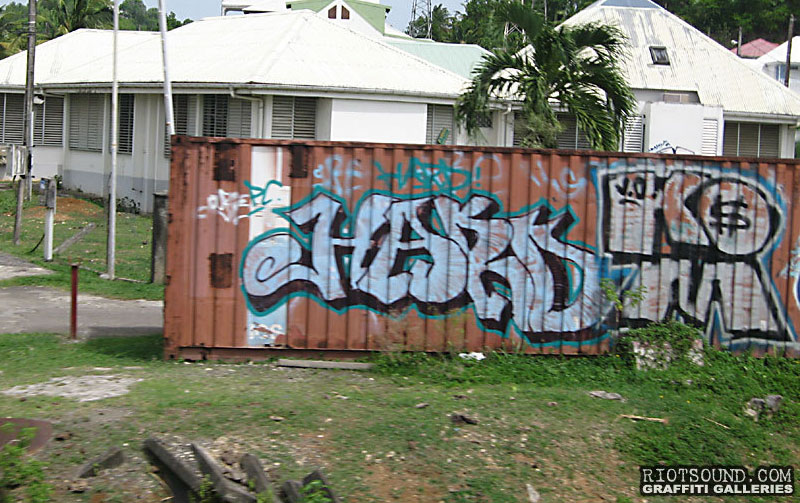

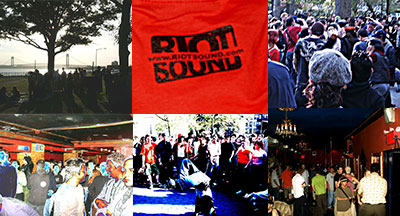
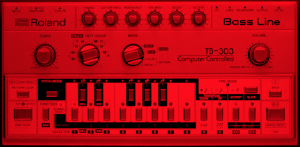













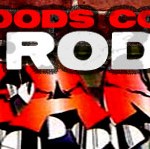


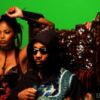
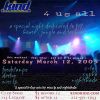
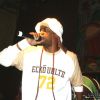

Comments